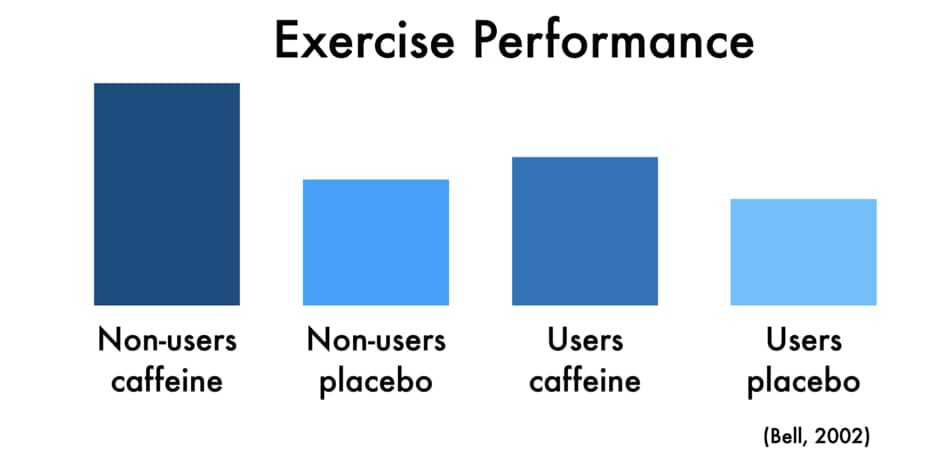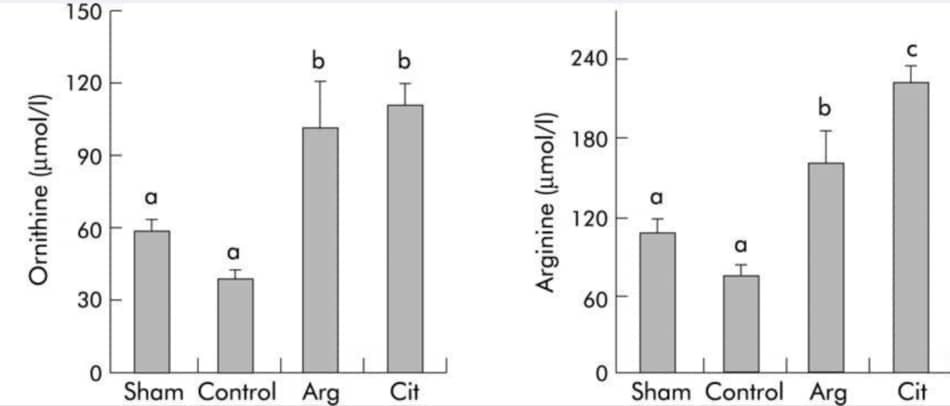You’re ready to hit the gym but you run out of pre-workout. No worries. Today I will explain how to make pre-workout coffee that lasts longer and hit harder (and is as effective as your pre-workout supplement).
In general, you can make pre-workout coffee by mixing instant or ground coffee with watermelon juice to improve nitric oxide bioavailability. You can also add freshly squeezed lemon juice, unflavored BCAA, and a pinch of pink salt to enhance mineral and antioxidant properties. However, the type of coffee you choose should depend on your caffeine tolerance.

I will also touch on some of the benefits of doing delicious homemade pre-workout coffee drinks, rather than artificially flavored supplements.
Can I Drink Coffee For Pre-Workout?
It’s not a secret that many people use coffee as a stimulant to enhance exercise capacity, as well as a pre-workout replacement.
For example, multiple studies have shown that coffee had a positive effect on endurance performance and activities that involve submaximal efforts such as running and cycling.
The reason why I love to use coffee for my pre-workout is that it’s rapidly absorbed through the gastrointestinal tract and has a long-lasting effect (even up to 6 hours after drinking).
Can I drink coffee for pre-workout?
As a whole, you can drink coffee as a pre-workout because it contains caffeine, which is an adenosine receptor antagonist and has ergogenic effects that can enhance energy production and eliminate fatigue. Caffeine also increases heart rate, alertness, and neurocognitive performance.
When it comes to performance, keep in mind that coffee effects may vary, depending on the sensitivity of the individual to caffeine.
For example, a fascinating study done by Douglas Bell and Tom McLellan has shown that non-coffee users experienced the significantly greater and longer-lasting ergogenic effect of caffeine, compared to regular coffee users.
In this study, all participants were taking a 5 mg/kg dose of caffeine.
See the graph below.

What kind of coffee to drink before a workout? In general, the best coffee to drink before a workout will depend on the person’s sensitivity to caffeine. Non-caffeine users can use instant coffee like a Nescafe because it has a low caffeine dose.
On the other hand, regular coffee drinkers should use brewed filter coffee, which has twice as much caffeine (more on that later).
Learn more: Click here to learn more about “how to make pea protein taste better“.
How To Make Pre Workout Coffee
Overall, you can make pre-workout coffee by mixing black instant or filter coffee with liquids that can enhance the supplement’s antioxidative properties, boost nitric oxide production in the body, and help to delay the onset of dehydration during exercise and improve exercise performance.
You can also add powers like cocoa, spirulina, lemongrass, or beetroot extract with beta-alanine, which is a commonly used ingredient in any of the pre-workout supplements.
Can you mix pre-workout with coffee? In general, you should not mix pre-workout with coffee because most of the pre-workouts already include a high amount of caffeine. Increasing the dose of caffeine can lead to shakiness, headaches, dehydration, and insomnia.
Plus, mixing coffee and pre-workout doesn’t taste good. If you wanna know how to make pre-workout taste better, check out my article.
Okay, wanna know how to make your pre-workout coffee at home? Here are 5 steps to transforming your standard coffee into an energy-boosting drink for your vein-popping workouts.
1. Use Instant or Ground Coffee
You can make pre-workout coffee from instant or filtered coffee. Instant coffee like Nescafe or Maxwell House is faster, cheaper, and more convenient to make than regular coffee because it dissolves in water immediately (cold or hot).
Here is the list of some of the most popular instant coffees with detailed caffeine content per serving to drink before a workout.
| Coffee for pre-workout | Caffeine |
|---|---|
| Folgers coffee | 30-40 mg per serving |
| Jacobs | 60 mg per serving |
| Nescafe | 50 mg per serving |
| Maxwell House | 112 mg per serving |
| Mount Hagen | 50-60 mg per serving |
| Death Wish Coffee | 300 mg per serving |
Is instant coffee good for pre-workout?
Overall, instant coffee is good for pre-workout because is made from Robusta coffee beans, which have twice more caffeine content as Arabica. The best time to drink coffee is 40 to 60 minutes before the workout.
On the other side, filtered coffee tastes better, but it’s more expensive and leaves the coffee grounds in the cup (which is not convenient at all). Alternatively, you can do espresso or americano in your coffee machine.
For my pre-workout coffee, I like to use a double shot of espresso (preferably cold) because it has low water volume and contains around 60 mg of caffeine per 1 fluid ounce (with a double shot that’s around 150mg).
Here I explain the benefits of drinking cold coffee before a workout. For those who need an extra “hit”, Black Label Coffee is also a good coffee choice for pre-workout.
This highly-caffeinated blend has over 1,500 milligrams of caffeine per serving (three times over the recommended daily dose).
2. Mix Coffee with Watermelon Juice
To make a pre-workout coffee at home you can add watermelon juice because it is a natural and rich source of the non-essential amino acid citrulline.
Citrulline is an ingredient often found in most pre-workout supplements that helps to increase athletic performance in high-intensity anaerobic exercises and relieve post-workout muscle soreness.
Is watermelon good before a workout?
In general, watermelon is good before a workout because it’s the richest known dietary source of the amino acid citrulline. The levels of citrulline in watermelon range from 3.9 to 28.5 mg/g of dry weight, depending on the type.
- Yellow flesh watermelon – 28.5 mg of citrulline per gram of dry weight.
- Orange flesh watermelon – 14.2 mg of citrulline per gram of dry weight.
- Red flesh watermelon 7.4 mg of citrulline per gram of dry weight.
In general, citrulline increases the bioavailability of L-arginine (which is then converted in the body into a chemical called nitric oxide that improve the blood flow by widening the blood vessels).
In fact, studies have shown that “citrulline raises arginine levels in plasma and all muscles much more effectively than arginine itself. Even at the intestinal level, citrulline can generate the same amounts of arginine as arginine itself” (Osowska, S et al. 2004).
See the graph below.

The graph on the right side illustrates the concentration of Arginine after ingestion of citrulline, arginine, and placebo.
Keep in mind that an increased concentration of L-arginine also stimulates the release of growth hormone, insulin, helps to increase blood flow, and strengthens muscle contraction (everything you need for a good workout).
3. Squeeze Fresh Lemon Juice
You can make pre-workout coffee by adding freshly squeezed lemon or lime juice not only to enhance the flavor but also to add powerful antioxidants and phytonutrients, which prevent cell damage from oxidation after the workout.
In other words, adding lemon juice to your pre-workout coffee helps with muscle strength and recovery after exhaustive exercise.
Dr. Lorena Funes from the Universidad Miguel Hernandez in Spain documented the effects of lemon on muscular damage markers. The researchers were trying to find out how the lemon extract influences antioxidant enzyme activity that helps to combat oxidative stress after 21 days of exercise.
See below.
| Enzyme | Groups | Day 1 | Day 21 |
|---|---|---|---|
| Catalase | Lemon Extract Placebo | 78.5 124 | 155 109 |
| Glutathione peroxidase | Lemon Extract Placebo | 49.5 46.1 | 75.0 74.0 |
| Glutathione reductase | Lemon Extract Placebo | 213 285 | 509 299 |
As you can see, the results have shown that “moderate antioxidant supplementation with lemon extract protects neutrophils against oxidative damage and decreases the signs of muscular damage in exercise without blocking the cellular adaptation to exercise” (Funes, Lorena et al. 2011).
This means that using lemon juice in your pre-workout coffee not only enhances the flavor but also makes the pre-workout more effective by accelerating recovery from DOMS and muscular fatigue.
4. Add Unflavoured BCAA
You can prepare pre-workout coffee by adding a serving scoop of unflavored branched-chain amino acids (BCAA). BCAA supplementation before exercise has a beneficial effect in reducing delayed onset muscle soreness (DOMS).
Is BCAA good for pre-workout? In general, BCAA is good for pre-workout because it helps to boost the rates of muscle protein synthesis (especially leucine), minimize protein breakdown, and reduce exercise-induced muscle damage.
You can think of leucine as the key player in muscle growth. It is well documented that protein supplements containing a high amount of leucine are more effective than others in triggering muscle protein synthesis.
Not only that.
Physical activity increases the rate of leucine oxidation and muscle protein breakdown. However, adding BCAA to your pre-workout coffee helps not only to lower muscle protein degradation but also improves recovery.
5. Add a Pinch Of Himalayan Salt
Adding pink Himalayan salt to your pre-workout coffee helps to delay the onset of dehydration during exercise and improve exercise performance.
Some data suggest that consumption of sodium before a workout in the heat has also a favorable effect on hydration status.
Dr. Hamouti from the University of Castilla-La Mancha in Spain documented the effects of drinking salty water before 120 min cycling race in 91 °F heat.
The results have shown that ingestion of salt with water before a workout increased plasma volume and helped to maintain cardiovascular performance, despite training in blazing-hot weather (Hamouti, N et al. 2014).
Is salt good pre-workout?
In general, pink salt originating from the Himalayas have higher levels of minerals, which is good to be taken with pre-workout coffee. Plus, taking salt before a workout helps to increase blood volume and improve blood flow, which allows you to work out longer.
NOTE: Don’t think that by adding extra salt you play with fire. One pinch of salt contains around 300 mg of sodium, which is around 12% of the daily recommended allowance, according to the CDC.
When To Drink Coffee Before A Workout?
In general, the best time to drink pre-workout coffee is 40 to 60 minutes before the exercise. Caffeine is absorbed almost immediately from the gastrointestinal tract into the bloodstream.
Not only that.
Approximately 90% of the caffeine contained in a cup of coffee is cleared from the stomach within 20 minutes (James, 2004).
The main effect of the coffee is antagonism of the potent endogenous neuromodulator, adenosine. This means the coffee temporarily “blocks” the fatigue signals from the brain.
I like to drink my pre-workout coffee around 30 minutes before hitting the gym. This gives me enough time to get to the gym, change my clothes and do a warmup.
Conclusion
In conclusion, the best way to make mouth-watering homemade pre-workout coffee you need to combine ingredients that are proven to have ergogenic effects like L-arginine, Citrulline, Caffeine, and Leucine.
These compounds can be found in foods like coffee, watermelon, and protein powder. You can also enhance flavor and boost pre-workout coffee antioxidant properties by adding lemon, lime, berries, cocoa powder, and beetroot extract.
